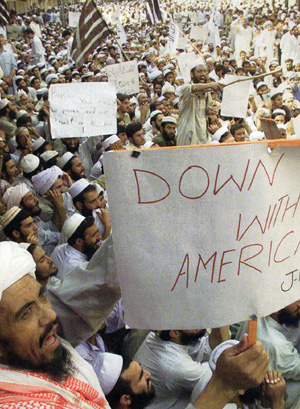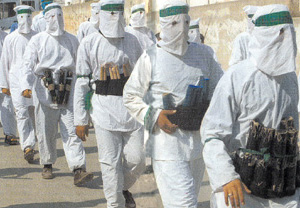 |
War against
Terrorism
Misguided Strategies
Atila Sinke Guimarães
Readers have asked me to be more specific about why I do not agree with some
traditionalists who are taking a position against the war. Here are my
points regarding their strategies.
1. The tone – I do not agree with the imperative tone they have taken.
Instead of presenting the anti-war position as an opinion, they present it
as a kind of dogma. Instead of a serene and logical exposition of their
reasoning turned toward convincing the reader, they are temperamental and
obsessive, condemning or ridiculing all who do not agree with them.
 |  |
Numerous Muslim factions openly supported the attacks of September 11
against the United States. Above, an angry demonstration in Pakistan
ten days after - Inside the Vatican, November 2001 | |
 |  |
Islamic admirers glorify Bin Laden after September 11 -
Actualite des Religions, January 2002 | |
 |  |
Following religious orientation, militants of the Palestinian Hamas wear
dynamite around their waists to manifest their desire to continue terrorist
acts - Actualite des Religions, December 2001 |
Also there are some, certainly a little hastily, who are speaking in the
name of all traditionalists, when this is not objective.
2. The main reason: the danger of Zionism – The rationale of those
traditionalists is that the war against terrorism would be a mere pretext to
give the state of Israel dominion over other nations in the Middle East, or
over an even broader cluster. Therefore, to avoid this danger, they are
against the war.
Let me set out my presupposition regarding the Jews. I am against racial
persecutions against Jews; therefore, I am against the Nazi torments
inflicted on members of this people. However, I do not agree with Judaism as
a religion, since it is deeply hostile to the Catholic Church and Catholic
doctrine. I think that the Jewish people have the right to their own state
just as do the Palestinian people or any other people. Nonetheless, I am
against Zionism insomuch as this movement links the establishment of the
state of Israel to messianic ideas of a Jewish universal hegemony over the
world.
Now, let us go to the present day facts. Given that the attacks of September
11, 2001 were clearly made by Islamic terrorists who hate the United States
as a symbol of Western Civilization, the U.S. is punishing the states that
support terrorist groups or could inflict on the U.S. a similar damage for
analogous reasons. This war against Afghanistan and Iraq – I include in the
same package an eventual development against Iran – was intended to be and
has been until now a war against countries that explicitly or implicitly
harbor terrorist groups, or represent a similar danger to the U.S.
Therefore, the evident reason for the war is Islamic terrorism. One can
discuss if it is just or not. No one of good sense, however, denies this
proportion between cause and effect.
Now then, some traditionalists have come out with a different elaborated
rationale. The war would have been and will be conducted to benefit the
Jews. Some others go so far as to suggest that the attacks of September 11
would have been mentored by Jews, the Arabs being just a tool. Therefore,
one should be against the war, etc.
My critique of this argument is: if no clear-cut evidence can be brought
forward about this role of the Jews in the terrorist attacks and the
supposed intentions of the U.S. government regarding the war, these
traditionalists are working with suspicions, hypotheses, assumptions.
Theoretically an analyst can consider these hypotheses in a complete
spectrum of the future possibilities of this war. However, in the practical
sphere, no serious man can pretend that such assumptions can surmount a
known reality, which is the responsibility of Islamic terrorism in the
attacks. If these persons insist on sustaining their personal assumptions as
a general shared opinion, they damage the cause of traditionalism in many
ways.
They damage it because they spread an image of non-sense over all
traditionalism.
They damage it because they go against the noble patriotism of American
citizens who support the war and pray for its success. They also go against
the heroic spirit of the American officers and soldiers who are exposing
their lives in defense of their country and their families. Therefore they
put the healthiest parcel of public opinion against traditionalism, at the
very moment when these persons would be psychologically open to hear a good
word from it.
They also favor the very focus of their concern: an eventual supremacy of
Israel over many other nations. If in a post-war negotiation, the American
government would attempt to impose a dominion of Israel over other nations,
which I consider improbable, the way to stop it would be to pressure the
government to cease such efforts. To be able to exert this pressure the
traditionalist movement would need unity and to be well accepted in public
opinion. Working against this possibility, the anti-war traditionalists have
broken the unity of the movement with their unilateral statements, and have
placed themselves against the best part of the American population. Id
est, indirectly they are creating now the conditions that make possible
the realization in the future of the very hypothesis they claim they are
trying to avoid.
3. The bad alliances – Also surprising are the inopportune alliances
these traditionalists implicitly have made in their platform against war.
Their natural allies in the temporal sphere are communists, hippies/punks,
gays/lesbians, and all kinds of political/cultural leftists. Their allies in
the religious sphere are the Muslims, principally the partisans of religious
terrorism, the Catholic Progressivists and their liberal equivalents in
other confessions.
These alliances have already produced bad fruits, one of which was to praise
and join an ecumenical ceremony of the consecration of Iraq to Our Lady of
Peace.
These are, in my opinion, the serious mistakes, mostly strategic, that some
traditionalists have taken regarding the present day war. I am sure that
there are many who do not agree with them and do not identify the described
particular positions with the entire movement.
In my next article, which will be on the TIA website soon, I plan to return to
the topic of the war. I think it is the moment for us, traditionalists, to
show how Natural Law and the Catholic Doctrine easily support this war.
This argument is
developed in Guimarães book War, Just War

|
War |
Hot Topics | Home |
Books | CDs |
Search | Contact Us |
Donate

© 2002- Tradition in Action, Inc. All Rights
Reserved
|
 |
|